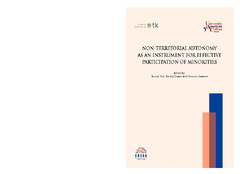Autonomy or Independence: Minority Arrangements for Vojvodina Hungarians and Kosovo Albanians in Serbia during and after the Yugoslav Period
Апстракт
The article offers a comparative analysis of minority politics and arrangements for the autonomy of Hungarians in Vojvodina and Albanians in Kosovo, which were Serbian territories and provinces during much of the 20th century. It discusses the reasons why minority struggles led to violence and independence in the Albanian case, while being peacefully accommodated within society, and even providing internal cohesion and good neighbourly relations, in the Hungarian case. The analysis follows both minorities from their post-1918 and post-1945 status in the two respective Yugoslavias, as well as in modern-day post-1990 Serbia. After providing a comparison of the political status of the two national communities, this comparative research argues against simplistic notions that view ethnic relations and conflicts in the Balkans as the result of centuries-old hatred and historically deeply rooted hostilities, and instead advocates a more nuanced perspective that is sensitive to subtleties, int...ernal interrelations and mutual dynamics in tackling majority/minority issues.
Кључне речи:
Albanians in Serbia / Hungarian national council / Hungarians in Serbia / Kosovo / minority rights / non-territorial autonomy / Vojvodina / YugoslaviaИзвор:
Non-Territorial Autonomy as an Instrument for Effective Participation of Minorities, 2021, 139-157Издавач:
- Budapest: Centre for Social Sciences
- Skopje: University American College
Финансирање / пројекти:
- Министарство науке, технолошког развоја и иновација Републике Србије, институционално финансирање - 200025 (Универзитет у Београду, Институт за филозофију и друштвену теорију) (RS-MESTD-inst-2020-200025)
Колекције
Институција/група
IFDTTY - CHAP AU - Pavlović, Aleksandar PY - 2021 UR - http://rifdt.instifdt.bg.ac.rs/123456789/2454 AB - The article offers a comparative analysis of minority politics and arrangements for the autonomy of Hungarians in Vojvodina and Albanians in Kosovo, which were Serbian territories and provinces during much of the 20th century. It discusses the reasons why minority struggles led to violence and independence in the Albanian case, while being peacefully accommodated within society, and even providing internal cohesion and good neighbourly relations, in the Hungarian case. The analysis follows both minorities from their post-1918 and post-1945 status in the two respective Yugoslavias, as well as in modern-day post-1990 Serbia. After providing a comparison of the political status of the two national communities, this comparative research argues against simplistic notions that view ethnic relations and conflicts in the Balkans as the result of centuries-old hatred and historically deeply rooted hostilities, and instead advocates a more nuanced perspective that is sensitive to subtleties, internal interrelations and mutual dynamics in tackling majority/minority issues. PB - Budapest: Centre for Social Sciences PB - Skopje: University American College T2 - Non-Territorial Autonomy as an Instrument for Effective Participation of Minorities T1 - Autonomy or Independence: Minority Arrangements for Vojvodina Hungarians and Kosovo Albanians in Serbia during and after the Yugoslav Period SP - 139 EP - 157 UR - https://hdl.handle.net/21.15107/rcub_rifdt_2454 ER -
@inbook{
author = "Pavlović, Aleksandar",
year = "2021",
abstract = "The article offers a comparative analysis of minority politics and arrangements for the autonomy of Hungarians in Vojvodina and Albanians in Kosovo, which were Serbian territories and provinces during much of the 20th century. It discusses the reasons why minority struggles led to violence and independence in the Albanian case, while being peacefully accommodated within society, and even providing internal cohesion and good neighbourly relations, in the Hungarian case. The analysis follows both minorities from their post-1918 and post-1945 status in the two respective Yugoslavias, as well as in modern-day post-1990 Serbia. After providing a comparison of the political status of the two national communities, this comparative research argues against simplistic notions that view ethnic relations and conflicts in the Balkans as the result of centuries-old hatred and historically deeply rooted hostilities, and instead advocates a more nuanced perspective that is sensitive to subtleties, internal interrelations and mutual dynamics in tackling majority/minority issues.",
publisher = "Budapest: Centre for Social Sciences, Skopje: University American College",
journal = "Non-Territorial Autonomy as an Instrument for Effective Participation of Minorities",
booktitle = "Autonomy or Independence: Minority Arrangements for Vojvodina Hungarians and Kosovo Albanians in Serbia during and after the Yugoslav Period",
pages = "139-157",
url = "https://hdl.handle.net/21.15107/rcub_rifdt_2454"
}
Pavlović, A.. (2021). Autonomy or Independence: Minority Arrangements for Vojvodina Hungarians and Kosovo Albanians in Serbia during and after the Yugoslav Period. in Non-Territorial Autonomy as an Instrument for Effective Participation of Minorities Budapest: Centre for Social Sciences., 139-157. https://hdl.handle.net/21.15107/rcub_rifdt_2454
Pavlović A. Autonomy or Independence: Minority Arrangements for Vojvodina Hungarians and Kosovo Albanians in Serbia during and after the Yugoslav Period. in Non-Territorial Autonomy as an Instrument for Effective Participation of Minorities. 2021;:139-157. https://hdl.handle.net/21.15107/rcub_rifdt_2454 .
Pavlović, Aleksandar, "Autonomy or Independence: Minority Arrangements for Vojvodina Hungarians and Kosovo Albanians in Serbia during and after the Yugoslav Period" in Non-Territorial Autonomy as an Instrument for Effective Participation of Minorities (2021):139-157, https://hdl.handle.net/21.15107/rcub_rifdt_2454 .



